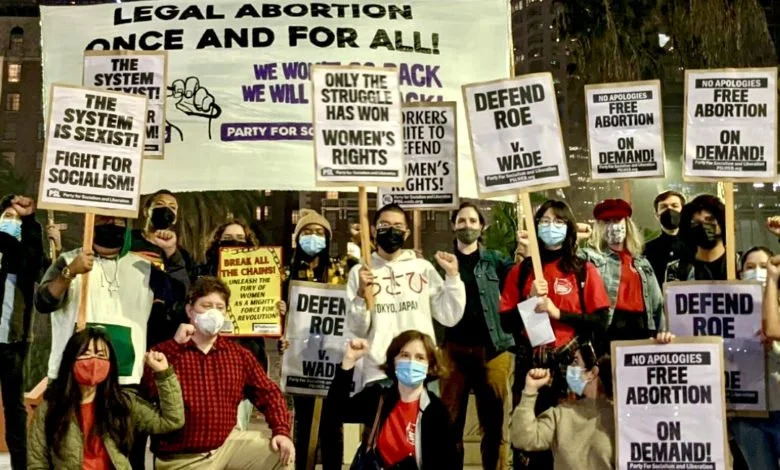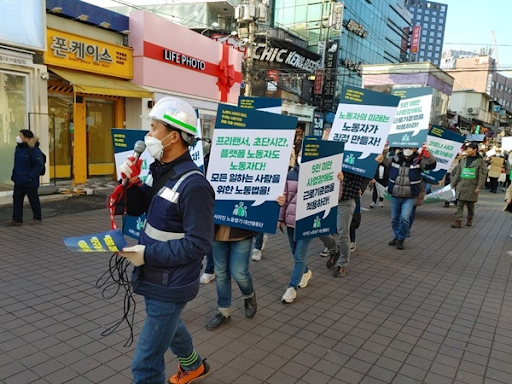SADD's "taking the subway at rush hour" is an act of disobedience toward a non-disabled-centered society, which does not guarantee the rights of the disabled as citizens as stipulated in the Constitution of the Republic of Korea. The responsibility lies with Korean politics and the government, who do not listen unless the disabled resort to screaming.
Read MoreOn Aug. 28, the International Strategy Center (ISC) and the Seoul Women’s Association held a Progressive Forum entitled “Post Roe v. Wade: Reproductive Rights Through a US Lens.” The following is the interview (conducted by ISC’s Zoe Yungmi Blank) with Joyce Chediac, a Redstockings member in the 1970s and currently an editor with the Party for Socialism and Liberation’s Liberation News and a staff member with its women’s publication Breaking The Chain. This is an abridged version edited for clarity and brevity.
Read MorePeople’s movement rapidly decreased as more people began working from home and many restaurants and cafes closed due to the lack of customers. In order to overcome the crisis, each country has injected huge amounts of money to restore the economy, but workers, ordinary people, small and medium-sized business owners and the self-employed are still experiencing much hardship.
Read MoreThe 2004 campaign to abolish discrimination against the disabled (through the Seoul subway and bus occupations) was able to achieve the installation of elevators to 90% of Seoul’s subways. Nonetheless, disability access to buses, taxis, and subway platforms is still lacking. As the Republic of Korea's constitution states, "all must be equal before the law." However, discrimination against race, LGBTQQ and disabled people still exists. On May 21, the International Strategy Center invited to our Progressive Forum Park Kyung-seok, co-President of the Solidarity Against Disability Discrimination, to hear about the history, achievements and tasks ahead for the disabled people’s struggle for mobility. This May Progressive Forum was co-organized by the Solidarity Against Disability Discrimination and the Korea Disability Forum, and co-hosted with the Democratic Socialists of America Disabilities Working Group and the Justice Party's International Progressive Politics Forum. Below is a summary of the conversation.
Read More"The movement for disability rights in Korea has been full-fledged since the 2001 struggle for the right to mobility. That year, the death of a person on a wheelchair after falling off a subway station lift sparked fierce protests and struggles demanding elevators at subway stations and low floor buses. Activists chained themselves to subway tracks and placed themselves in front of buses. The movement fought, often enduring insults, to expose society’s hypocrisy and change a society centered on the non-disabled towards one in which no one is marginalized."
Read MoreOn April 10, the International Strategy Center held its monthly Progressive Forum on “How NATO and Sanctions Perpetuate War and Suffering.” It hosted Reiner Braun (executive director of the 131 year old International Peace Bureau, a founder of the No to NATO Network, and author of Einstein - Peace Now); and Vijay Prashad (journalist, author, and director of the Tricontinental Institute for Social Change). The event involved presentations, followed by questions from the ISC and audience members. Below is a synthesis of the presentations and Q&A.
Read MoreOn April 10, the International Strategy Center held its monthly Progressive Forum on “How NATO and Sanctions Perpetuate War and Suffering.” It hosted Reiner Braun (executive director of the 131 year old International Peace Bureau, a founder of the No to NATO Network, and author of Einstein - Peace Now); and Vijay Prashad, journalist, author, and director of the Tricontinental Institute for Social Change. The event involved presentations, followed by questions from the ISC and audience members.
Read More“...Even the prominent US diplomat George Kennan, who authored the post Second World War American foreign policy towards the Soviet Union, warned, in 1998, that NATO expansion was not a good idea. Russians would "gradually react quite adversely, and it will affect their policies." It was a strategic mistake. There was no reason for this whatsoever. No one was threatening anyone else.
Now, there is an interesting dynamic in NATO expansion. We, of course, also have the agency of the countries between NATO and Russia. Most of these countries historically felt a threat from the east. And that's why their elites (in Poland, or Czech Republic, etc) wanted to be part of the NATO security structure. So there is also that local agency there. It's not only about two big powers.
However, when the expansion came closer and closer to the Russian border, that of course increased the tension. And so if American policy played a role that would be opening the door of NATO to Georgia and Ukraine. If we had a time machine and went back to 1991, and defined Ukraine, Belarus as neutral states, as happened with Finland and Austria, we wouldn't be experiencing many issues we are experiencing now. But that's, of course, a missed opportunity. Now, we have a completely different reality and dynamics…”
Read MoreKim Jong Min has been involved in South Korean progressive political parties for the past 20 years beginning with the Democratic Labor Party that had been established in 2002, followed by the last 10 years in the Justice Party. He is currently the co-President of the civil society organization Together Seoul and, in this past presidential election, he was in charge of the Strategy Headquarters for the Justice Party.
Read MoreToday the ISC had the tour at Seodaemun Prison History Hall where we can learn about Japanese colonial era. We met up with 7 participants of various backgrounds outside of the museum, held a tour and discussion through the museum, and continued conversation over dinner at a nearby traditional market. We discussed parallels between other examples of colonialism, holes and biases in our historical educations, and what led to the Japanese Colonial Era, the following US imperialism, and Issues that remain unresolved. As this is the first in a series, keep your eyes out for the next ISC tour, and our follow up movie night!
Read More. The political establishment and its presidential candidates pay no attention to the workers losing lives from industrial accidents, the women suffering from gender-based violence, the LGBT community subject to harsh discrimination, and the disabled with limited access to basic rights. This is why the Joint Electoral Action movement started, to take the people’s demands to the streets, rather than relying on politicians to speak for them.
Read More미국민주적사회주의자는 코리아 피스 나우, 국제전략센터, 위민크로스DMZ, 노둣돌과 같은 단체들과 연대하여 미국의 지정학적 이익을 위한 군사적, 경제적 간섭 없이 한반도가 평화, 자주, 화해를 만드는 과정을 시작할 수 있게 미국이 북한 여행금지 조치와 제재를 철회하고 한국전쟁의 공식적인 종전을 추진할 것을 촉구하는 바이다.
Read MoreDeinstitutionalization is not simply a matter of physical space that calls for the dismantling of large-scale care institutions. The institutionalized disabled must return to their families, and to society at large. The reality is that many deinstitutionalized disabled rely on the support of their families. However, care from their families is not enough, and society and the state must take responsibility. If the government simply postpones this process as it readies itself, then the process will never begin. The government must recognize deinstitutionalization as a responsibility and then actively begin its implementation.
There can be no dignity for anyone, without dignity for the disabled.
Read MoreTo help explain the crisis in Ukraine, the International Strategy Center (ISC) interviewed Volodomyr Ishchenko (Ishchenko), a Research Associate at Osteuropa-Institut Berlin and a member of PONARS Eurasia. Ischenko’s work on deficient revolutions and Ukrainian protest movements have made him a sought out left wing voice on Ukrainian politics, including interviews and articles with the Jacobin Magazine, Al Jazeera, and Truthout. Below is an excerpt of an interview with Ischenko by the International Strategic Center for our monthly Progressive Forum.
Read MoreLet us examine social housing in Korea. The Korean Social Housing Association was founded in 2015, and has supplied 4,389 (3,316 in Seoul, 883 in Gyeonggi-province) housing units in the Seoul metropolitan area as well as the Jeollabuk-do province, and the city of Busan. With cooperatives, schools, small and medium enterprises and non-profit organizations participating, the Association provides social housing appropriate to Korea’s conditions (revitalizing empty homes, collective housing etc.). However, still in its nascent stage, it is financially dependent on local government funding, thus leading to a very low supply. The current data casts doubt over the future sustainability of the Association, and a new direction of improvement must be sought.
How Dutch social housing reached such a high distribution
The Netherlands’social housing started in the 19th century to solve the housing crisis of urban workers. Through the World Wars, the urban housing shortage worsened, and the government supported the establishment of cooperatives to provide workers with social housing. However, unlike Korean public housing, which is limited to low-income households, Dutch social housing was universal, available to everyone. In addition, the Netherlands’ social housing is operated not by the government but by housing associations (80% non-profit, 20% for-profit). Currently, the Netherlands has 2.25 million units of social housing. And in its capital, Amsterdam, nine housing associations under the Amsterdam Federation of Housing Associations own and operate 190,000 housing units.
Read MoreLike the rest of the world, South Korea is also experiencing economic difficulties due to COVID-19. In Korea, resentment among self-employed shopkeepers is increasing. This is because the government's measures for self-employed shopkeepers are not enough while the latter have to bear great financial losses due to the government's social distancing measures. The government’s compensation for the shopkeepers remains paltry and its social distancing measures are sacrificing them again.
Read MoreWe invite Fatima Hassan, co-founder and director of Health Justice Initiative and discuss how to dismantle justice inequity and injustice and finally resolve the COVID19 pandemic.
Read MoreThe ISC, the Yongsan Citizens' Alliance, Justice Party of Seoul, the South Korean Network for Housing Rights and Solidarity for Housing Rights talk with Volkan Sayman (sociologist and researcher with the Expropriate Deutsche Wohnen & Co.) about the organizing that achieved the victory, the challenges and tasks ahead, and their vision of social housing.
Read MoreNov. 25 is the International Day for the Elimination of Violence against Women. The date was first selected in 1981 to honor three sisters who had fought against the Dominican dictatorship. In 2000, it was designated an international day by the UN.
Read MoreAs the world braces to deal with global warming, there is much focus on Green New Deals that can stimulate the economy, provide good paying jobs, and transition our economies away from fossil-fuel intensive production and towards sustainable production. Economist, activist, and co-founder of the Jubilee 2000 campaign (to forgive Third World Debt) Ann Pettifor describes how a Green New Deal might be funded by government financing and how it must radically transform our economies to be sustainable and equitable. This information deck summarizes her key ideas as well as critically evaluating them.







![[April Progressive Forum] How NATO & Sanctions Perpetuate War & Suffering](https://images.squarespace-cdn.com/content/v1/5b027627f2e6b1d4bfbe16c5/1649816191584-5BYVDVA702S0M9DCJFEB/photo_2022-04-13_11-06-19.jpg)


![[ISC March History Tour] Seodeamun Prison: A Remnant of the Japanese Colonial Era](https://images.squarespace-cdn.com/content/v1/5b027627f2e6b1d4bfbe16c5/1647778635070-L8Q6IC0TOAMC0Q6G0KY8/photo_2022-03-20_20-56-36.jpg)




![[December Progressive Forum] How Vaccine Inequity Created Omicron](https://images.squarespace-cdn.com/content/v1/5b027627f2e6b1d4bfbe16c5/1639881176118-RBE7O7R5MHWOIWXMZTQK/12%EC%9B%94%EC%A7%84%EB%B3%B4%ED%8F%AC%EB%9F%BC.jpg)
![[ISC Progressive Forum] Berlin Historic Vote for Housing for All: Referendum Victory to Expropriate and "Socialize" Housing](https://images.squarespace-cdn.com/content/v1/5b027627f2e6b1d4bfbe16c5/1639880736750-R4PDYOZU8V6NIP1EETSS/11%EC%9B%94+%EC%A7%84%EB%B3%B4%ED%8F%AC%EB%9F%BC.jpg)

